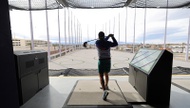
13 Hours: The Secret Soldiers of Benghazi John Krasinski, James Badge Dale, David Costabile. Directed by Michael Bay. Rated R. Opens Friday.
Director Michael Bay has been adamant that 13 Hours: The Secret Soldiers of Benghazi, his film about the 2012 attacks on U.S. government facilities in Benghazi, Libya, is not a political movie, and in the sense that it never specifically references Barack Obama or Hillary Clinton or any other American politician, it isn’t. But like other recent true-story-inspired military action movies (American Sniper, Lone Survivor, Act of Valor), 13 Hours has a tone of such extreme hero worship that it distorts the reality it’s meant to portray. By narrowing its focus solely to the military personnel on the ground and turning those people into superhuman beacons of perfect morality, it creates a skewed view not only of the motivations for warfare and terrorism, but also of the flawed human beings at its center.
Being a Michael Bay movie, though, 13 Hours is mainly interested in blowing stuff up. The director of Armageddon and the Transformers movies is a master of cinematic explosions, and he fills 13 Hours with many of them, along with gun battles, car chases and other action-movie staples. There are tense moments as six private paramilitary contractors (all former members of elite U.S. military units) attempt to protect a U.S. diplomatic compound and then a covert CIA annex from waves of attacks by insurgents. Whatever the political actions that led to these circumstances, Bay knows how to leave them behind and focus on heavily armed dudes shooting at each other.
Nearly two and a half hours of that action gets a bit monotonous, though, and when Bay and screenwriter Chuck Hogan try to develop those dudes beyond “manly men with large guns,” the movie falters, relying on sappy flashbacks and familial heartstring-tugging (one character conveniently learns of his wife’s pregnancy just before all hell breaks loose). In eschewing any political commentary, Bay and Hogan omit any motivation or reasoning behind the attacks, and not a single insurgent gets so much as a name or more than a single line. If the movie has a villain, it’s the unnamed officious local CIA director (David Costabile) who hesitates in allowing the soldiers to spring into action. Bay makes the movie into a story of Real American Men versus Bureaucratic Pussies, using all of his bombastic filmmaking tools (at one point he trains his trademark low-angle hero shot on a paper shredder) to flatten out a complex geopolitical situation—and the people caught up in it.







